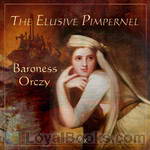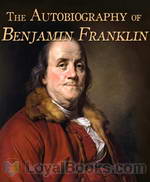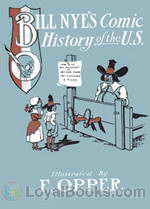|
Books Should Be Free Loyal Books Free Public Domain Audiobooks & eBook Downloads |
|
|
Books Should Be Free Loyal Books Free Public Domain Audiobooks & eBook Downloads |
|
History Books |
|---|
|
Book type:
Sort by:
View by:
|
By: Barack Obama (1961-) | |
|---|---|
 Inaugural Presidential Address
Inaugural Presidential Address
| |
By: Baroness Emmuska Orczy (1865-1947) | |
|---|---|
 El Dorado
El Dorado
If you've read and loved the exciting classic The Scarlet Pimpernel then you'd probably be delighted to follow the further adventures of the dashing Sir Percy Blakeney. El Dorado by Baronness “Emmuska” Orczy depicts the intrepid swordsman and escape artist in the role of savior of the French royal family. Published in 1913, El Dorado was the fourth in the Pimpernel series of eleven books, numerous short stories and other related writings about her famous British adventurer. However, Orczy did not always follow a strict chronological sequence while publishing the novels and hence, there is plenty of overlap between the time frames of the stories... | |
 The Elusive Pimpernel
The Elusive Pimpernel
First Published in 1908, The Elusive Pimpernel by Baroness Orczy is the 4th book in the classic adventure series about the Scarlet Pimpernel. | |
By: Bartolomé de las Casas (1484-1566) | |
|---|---|
 Brief Account of the Destruction of the Indies
Brief Account of the Destruction of the Indies
A Short Account of the Destruction of the Indies (Spanish: Brevísima relación de la destrucción de las Indias) is an account written by the Spanish Dominican friar Bartolomé de las Casas in 1542 (published in 1552) about the mistreatment of the indigenous peoples of the Americas in colonial times and sent to then Prince Philip II of Spain. One of the stated purposes for writing the account is his fear of Spain coming under divine punishment and his concern for the souls of the Native Peoples... | |
By: Basil Hall (1788-1844) | |
|---|---|
 Account of a Voyage of Discovery to the West Coast of Corea, and the Great Loo-Choo Island
Account of a Voyage of Discovery to the West Coast of Corea, and the Great Loo-Choo Island
| |
By: Basil L. (Basil Lanneau) Gildersleeve (1831-1924) | |
|---|---|
 The Creed of the Old South 1865-1915
The Creed of the Old South 1865-1915
| |
By: Baxter Perry Smith (1829-1884) | |
|---|---|
 The History of Dartmouth College
The History of Dartmouth College
| |
By: Bayard Taylor (1825-1878) | |
|---|---|
 Northern Travel Summer and Winter Pictures of Sweden, Denmark and Lapland
Northern Travel Summer and Winter Pictures of Sweden, Denmark and Lapland
| |
By: Bede Jarrett (1881-1934) | |
|---|---|
 Mediaeval Socialism
Mediaeval Socialism
| |
By: Ben J. (Ben Johannis) Viljoen (1868-1917) | |
|---|---|
 My Reminiscences of the Anglo-Boer War
My Reminiscences of the Anglo-Boer War
| |
By: Ben Jonson (1573-1637) | |
|---|---|
 Sejanus: His Fall
Sejanus: His Fall
| |
 The Poetaster
The Poetaster
| |
By: Benjamin Disraeli (1804-1881) | |
|---|---|
 Alroy The Prince Of The Captivity
Alroy The Prince Of The Captivity
| |
 Lord George Bentinck A Political Biography
Lord George Bentinck A Political Biography
| |
By: Benjamin Drake (1794-1841) | |
|---|---|
 Great Indian Chief of the West Or, Life and Adventures of Black Hawk
Great Indian Chief of the West Or, Life and Adventures of Black Hawk
| |
 Life of Tecumseh, and of His Brother the Prophet With a Historical Sketch of the Shawanoe Indians
Life of Tecumseh, and of His Brother the Prophet With a Historical Sketch of the Shawanoe Indians
| |
By: Benjamin Franklin (1706-1790) | |
|---|---|
 The Autobiography of Benjamin Franklin
The Autobiography of Benjamin Franklin
Inventor, author, printer, scientist, politician, diplomat—all these terms do not even begin to fully describe the amazing and multitalented, Benjamin Franklin who was of course also one of the Founding Fathers of America. At the age of 75, in 1771 he began work on what he called his Memoirs. He was still working on it when he died in 1790 and it was published posthumously, entitled An Autobiography of Benjamin Franklin. The book had a complicated and controversial publication history. Strangely enough, the first volume only was first published in French, in Paris in 1791... | |
By: Benjamin Franklin Schappelle (1885-) | |
|---|---|
 The German Element in Brazil Colonies and Dialect
The German Element in Brazil Colonies and Dialect
| |
By: Benjamin Louis Eulalie de Bonneville (1796-1878) | |
|---|---|
 The Adventures of Captain Bonneville, U. S. A., in the Rocky Mountains and the Far West
The Adventures of Captain Bonneville, U. S. A., in the Rocky Mountains and the Far West
| |
By: Benjamin Perley Poore (1820-1887) | |
|---|---|
 Perley's Reminiscences, v. 1-2 of Sixty Years in the National Metropolis
Perley's Reminiscences, v. 1-2 of Sixty Years in the National Metropolis
| |
By: Benjamin Waterhouse (1754-1846) | |
|---|---|
 A Journal of a Young Man of Massachusetts, 2nd ed.
A Journal of a Young Man of Massachusetts, 2nd ed.
| |
By: Bennet Burleigh (-1914) | |
|---|---|
 Khartoum Campaign, 1898 or the Re-Conquest of the Soudan
Khartoum Campaign, 1898 or the Re-Conquest of the Soudan
| |
By: Benson John Lossing (1813-1891) | |
|---|---|
 Washington and the American Republic, Vol. 3.
Washington and the American Republic, Vol. 3.
| |
By: Benvenuto Cellini ((1500-1571)) | |
|---|---|
 The Autobiography of Benvenuto Cellini
The Autobiography of Benvenuto Cellini
Cellini’s autobiographical memoirs, which he began writing in Florence in 1558, give a detailed account of his singular career, as well as his loves, hatreds, passions, and delights, written in an energetic, direct, and racy style. They show a great self-regard and self-assertion, sometimes running into extravagances which are impossible to credit. He even writes in a complacent way of how he contemplated his murders before carrying them out. He writes of his time in Paris: Parts of his tale recount... | |
By: Bernard Henry Becker (1833-) | |
|---|---|
 Disturbed Ireland Being the Letters Written During the Winter of 1880-81.
Disturbed Ireland Being the Letters Written During the Winter of 1880-81.
| |
By: Bertha F. Herrick | |
|---|---|
 Myths and Legends of Christmastide
Myths and Legends of Christmastide
| |
By: Bertram Lenox Simpson (1877-1930) | |
|---|---|
 The Fight for the Republic in China
The Fight for the Republic in China
| |
By: Bertram Mitford (1855-1914) | |
|---|---|
 The Sign of the Spider
The Sign of the Spider
| |
By: Bertrand Russell | |
|---|---|
 Proposed Roads to Freedom
Proposed Roads to Freedom
Bertrand Russell, 3rd Earl Russell (1872 – 1970) was a British philosopher, logician, mathematician, political activist and Nobel laureate. He led the British “revolt against idealism” in the early 1900s and is considered one of the founders of analytic philosophy along with his predecessor Gottlob Frege and his protégé Ludwig Wittgenstein. In this book, written in 1918, he offers his assessment of three competing streams in the thought of the political left: Marxian socialism, anarchism and syndicalism. | |
 The Practice and Theory of Bolshevism
The Practice and Theory of Bolshevism
| |
By: Bill Nye | |
|---|---|
 Comic History of the United States
Comic History of the United States
For American journalist and humorist Edgar Wilson Nye who wrote under the pen name Bill Nye in the late 19th century, facts are not to be presented in their newborn, bare state. They should be properly draped and embellished before they can be presented before the public. Hence, in the Comic History of the United States published in 1894, he gives his readers the facts. But in a bid to make the historical figures more human he describes them as “people who ate and possibly drank, people who were born, flourished and died, not grave tragedians posing perpetually for their photographs... | |
 Comic History of England
Comic History of England
If you thought history was dull, dry and boring, you haven't read Bill Nye's books! He brings wit, humor, satire, irony and sheer nonsensical fun into the subject, making it both entertaining and memorable. The Comic History of England was published posthumously in 1896 after the writer's tragic and untimely death half-way through the project. Hence it remains incomplete and covers the history of the island nation only up to the Tudor period. However, beginning with Julius Caesar, the Roman invasion of Britain, the Druids and Stonehenge, this book is still a rib-tickling ride through the centuries... | |